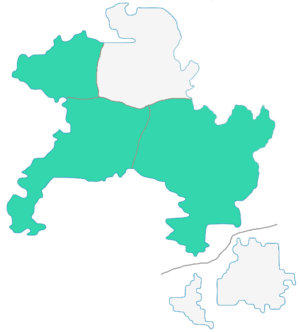Akashian general election, 1962
| |||||||||||||||||||||||||||||||||||||||||||||||||||||||||||||||||
200 seats in the National Assembly 101 seats needed for a majority | |||||||||||||||||||||||||||||||||||||||||||||||||||||||||||||||||
|---|---|---|---|---|---|---|---|---|---|---|---|---|---|---|---|---|---|---|---|---|---|---|---|---|---|---|---|---|---|---|---|---|---|---|---|---|---|---|---|---|---|---|---|---|---|---|---|---|---|---|---|---|---|---|---|---|---|---|---|---|---|---|---|---|---|
| Turnout | 87,7% | ||||||||||||||||||||||||||||||||||||||||||||||||||||||||||||||||
| |||||||||||||||||||||||||||||||||||||||||||||||||||||||||||||||||
 | |||||||||||||||||||||||||||||||||||||||||||||||||||||||||||||||||
| |||||||||||||||||||||||||||||||||||||||||||||||||||||||||||||||||
A general election was held in Akashi on 30 June 1962. The incumbent Yurika Ehara government was re-elected with a majority.
This was famous as the "election of alliances" (Miranian: 同盟の選挙 Dōmei no senkyo). Building on the United Left from 1960, the Socialist Party, Liberal Party, National Democratic Party, Communist Party, Workers' Party, and Social Credit Party formed the United Opposition in an attempt to defeat the Yurikara government.
In turn, the National Cooperative Party and Agrarian Party formed the Centre List, having declined to join the United Opposition, while the Conservative National Party and Akashi Renewal Party banded together in the Conservative List. This left the National Union as the only party running alone in the election, under the banner of the National List.
The campaign was fractious due to the size of the United Opposition and difficult questions over seat distribution that had been sidestepped to simply organise the alliance for election. Within the alliance, there was tension between the left and right — the NDP and LP resented sharing a list with the CP and WP, while the CP and WP still pursued their rivalry against the SP. The NU attacked the United Opposition over this ambiguity, warning voters they could not be sure who they were voting for.
Results
| General election, 30 June 1962 | ||||||
|---|---|---|---|---|---|---|

| ||||||
| Party | Votes | % | +/− | Seats | +/− | |
| National Union | 1.906.725 | 50,5% | -0,2% | 104 | -3 | |
| Socialist Party | 1.227.100 | 32,5% | +8,6% | 11 | -11 | |
| Liberal Party | 11 | -1 | ||||
| National Democratic Party | 11 | +4 | ||||
| Communist Party | 11 | +5 | ||||
| Workers' Party | 11 | +6 | ||||
| Social Credit Party | 11 | +11 | ||||
| National Cooperative Party | 528.597 | 14,0% | -1,0% | 14 | -4 | |
| Agrarian Party | 14 | +2 | ||||
| Conservative National Party | 75.514 | 2,0% | -3,0% | 0 | -6 | |
| Akashi Renewal Party | 0 | ±0 | ||||
| Independents | 37.757 | 1,0% | -1,0% | 2 | -3 | |
| Total | 3.775.693 | 100% | — | 200 | — | |
| Registered voters and turnout | 4.305.237 | 87,7% | ||||
1 All seat changes and percentages compared to the parties' cumulative totals in 1958.
- Government: National Union majority.
The United Opposition failed to accomplish its goal. While it cumulatively increased its vote by 8,6%, it didn't defeat the NU. It won 66 seats in total, which had to be divided among 6 parties, causing further acrimony. Ultimately, each member party took 11 seats in the National Assembly.
The Centre List did better, weathering a 1% vote decline and giving both its parties 14 seats each. The CNP suffered a backlash for teaming up with the ARP, and lost all its seats.
Although the United Opposition was a failure, it fueled a rapprochement between the CP and WP. Additionally, this was the first general election where the NU didn't manage a clean sweep of all provinces, as the United Opposition won pluralities in Kobi and Shimachi.
